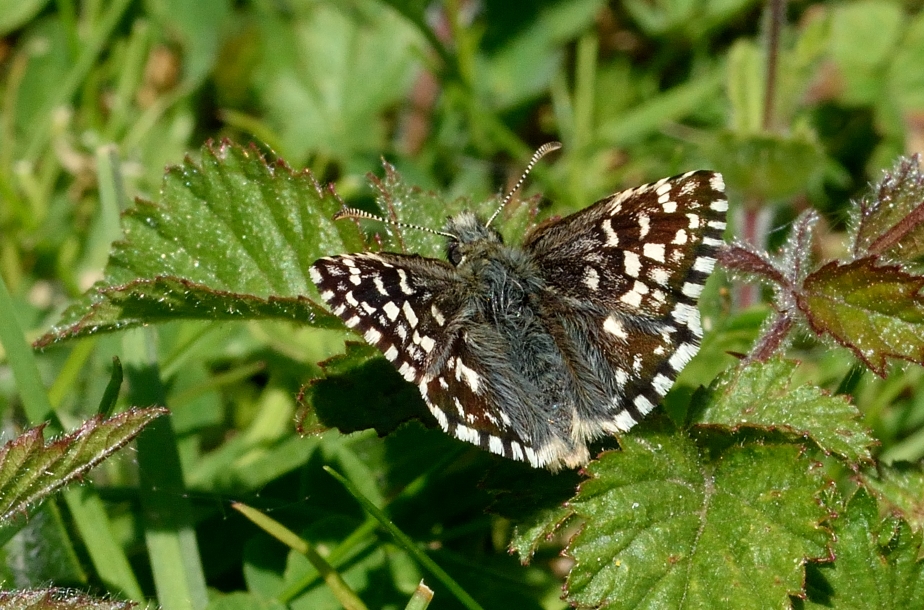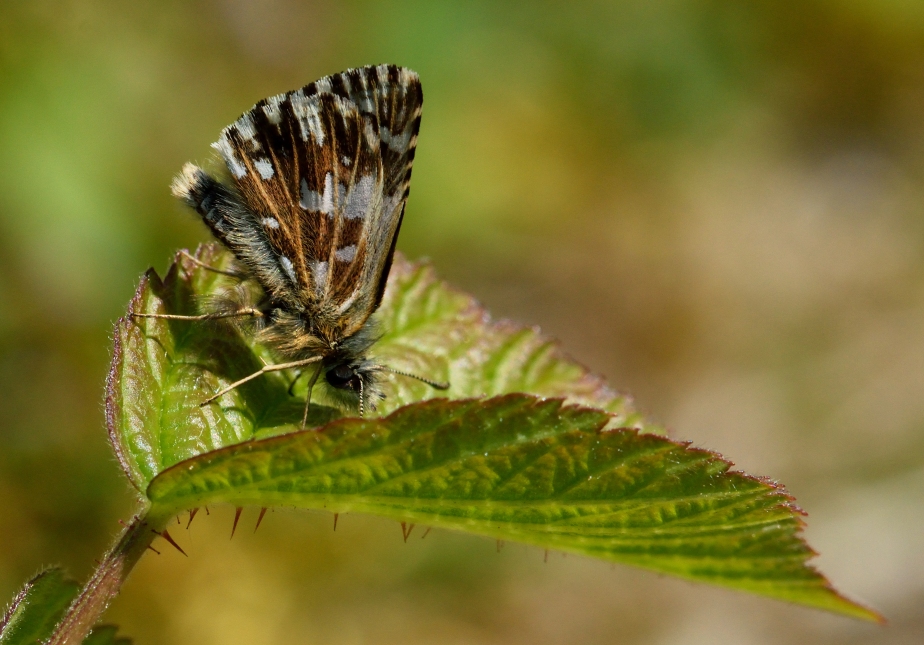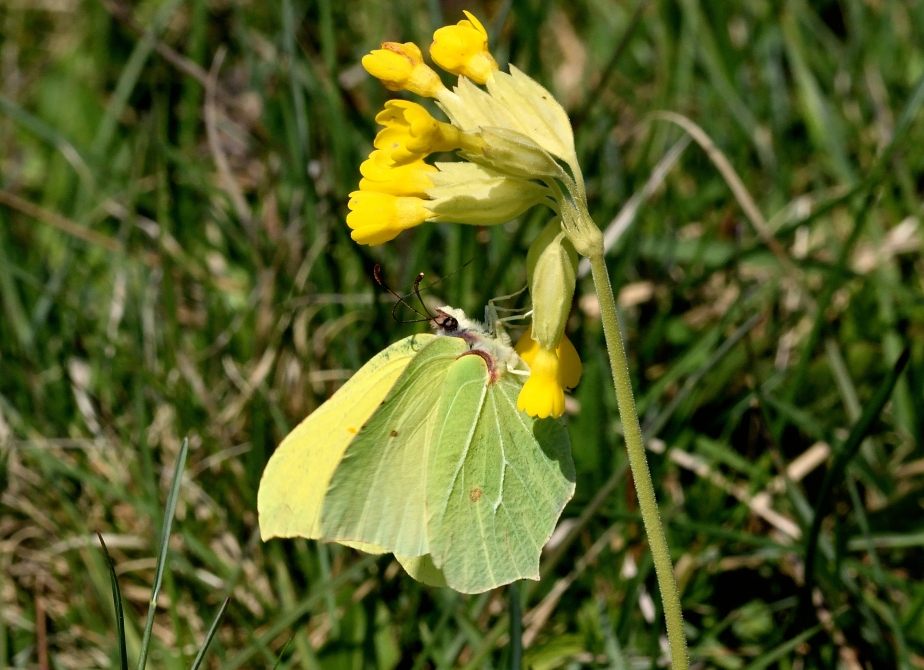No not a post about a grumpy seafarer, or the captain of my local football team after another defeat. This is Norfolk’s rarest and smallest butterfly, the Grizzled Skipper (Pyrgus malvae) Today was glorious weather so Tina and I traveled across to Breckland, in the south west of the county, to search for them at the only two sites they occur.

We started at Foulden Common but after a couple of hours we only had the briefest of an in-flight sighting. There were many Brimstones and Orange Tips but on the Skipper front things were not looking good. They should have emerged by now, last year I saw them in April. So after a picnic we decided to go to the cut-off channel at Stoke Ferry, 4 miles away. Searching the chalk banks and eventually I spotted a fresh male. It sat on a purple flower of bugle wings open, perfect, except I hadn’t turned my Camera on!!

Luckily I did manage to get some nice shots, but not on a flower. These butterflies only have a wingspan of 23-29 mm (about 1 inch) and they fly fast and low to the ground so they are very difficult to spot and follow. They are becoming increasingly rare across southern England. Their caterpillars like to feed on wild strawberry and agrimony.
On my HOME page there is a portfolio with more info https://blhphotoblog.wordpress.com/portfolio/skippers-hairstreak-may-2017


Wonderful!
LikeLiked by 1 person
Grizzled Skipper? 🙂 What a funny name.
And quite the fuzzy striped spotted creature!
Fabulous shots, Brian! Nice find. Kudos, UT
LikeLiked by 1 person
Our ancestors certainly thought up some weird names UT, thanks for popping by enjoy the rest of the day!
LikeLiked by 1 person
A butterfly with hairy feathers—I know of a bird like that …
LikeLiked by 1 person
Yep I’ve known a few in the past…er what ‘ birds’ are we referring to?
LikeLike
Never date a dame with more stubble than yourself … even a kiwi …
LikeLiked by 1 person
Excellent advice! You could get more than you bargain for.
LikeLike
Kiwi birds—variously described as flightless birds with hairy feathers; or long beak, full of s**t and can’t fly …
LikeLiked by 1 person
Ah ! crossed wires there, for one terrible moment I thought we were discussing……..
LikeLike
Hah! So did I …
LikeLike
Well done and congratualtions, Brian! Lovely photos! Such a beautiful butterfly.
LikeLiked by 1 person
Thanks Pete it was hard work finding them they must be very late this year.
LikeLiked by 1 person
Beautiful images, Brian. I admire your dedication to pursue them out in the ”wild”. I have yet to venture farther afield from my garden.
LikeLiked by 1 person
Cheers Ark, such a beautiful day the countryside was calling.
LikeLike
Another vivid set of pictures to up my butterfly knowledge – liking this fuzzy species
LikeLiked by 1 person
They are rather on the furry side Brian, you have 200 species of Skipper Stateside we have only 8, must be fun trying to id that lot.
LikeLiked by 1 person
Congratulations Bryan!! It’s a beautiful butterfly. I miss in Germany the biodiversity of butterflies. Some of them I saw many years ago. It is a delight for me to find them in blogs like yours!
LikeLiked by 1 person
Lovely comment Simone thank you, I enjoy looking for nature and sharing my photos. Are the butterflies now rare in Germany?
LikeLiked by 1 person
Yes, yes, we have a dramatic decline in insects. I write it in my blog post “Fatale Folgen – Fatal consequences”. In last sommer I saw only butterflies, which like the nitrate-rich soils. But the main problem is the use of chemicals in the industrial agriculture. It’s so sad!!
LikeLiked by 1 person
These chemicals are a big problem, we are lucky in the UK we have a lot of nature reserves and conservation groups to try and save what we have left, but it is not enough.
LikeLiked by 1 person
Hey, nominated you for The Liebster Award. Please look forward to it. 😊
LikeLike
Absolutely Gorgeous Brian! It’s great that you and Tina enjoy exploring together!
LikeLiked by 1 person
Ha Ha but she does not have much patience! Her favourite line “Haven’t you got enough photos of them yet?” can wind me up a bit! Thanks for popping by Michael.
LikeLiked by 1 person
Haha – My wife, Gail, would relate well to Tina! – although she never complains. Sometimes, before we go on an outing, I will inform her that I am not taking my camera – although I always have my cell phone if a good photo-opportunity arises.
LikeLiked by 1 person
Brilliant find and photos. Our wild strawberry has really taken over the bank that it is on so hopefully……
LikeLiked by 1 person
It would be great if Grizzled Skipper could colonise your site, plenty of food!
LikeLike
What a beauty! Here in NL it’s called “strawberry butterfly” and is red-listed, I’ve never seen it. Thanks for sharing these nice images, Brian 🙂
LikeLiked by 1 person
What a great name! Thanks Camilla.
LikeLiked by 1 person